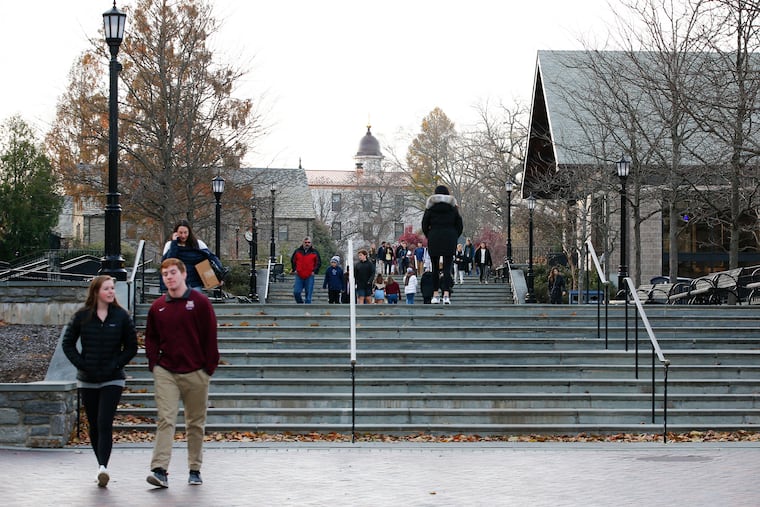Villanova faces blowback after director of counseling center associates Zionism with fascism in presentation
The presentation at a local therapy conference prompted a letter-writing campaign. The director says she’s received physical threats online.

At a psychology conference last month, hundreds of therapists, researchers, and students descended on the Philadelphia Marriott Downtown in Center City to catch up on the latest in the field. The day culminated in a session on antiracism, led by Nathalie Edmond, a psychologist who directs Villanova University’s Counseling Center.
Two slides from her session about dismantling oppression prompted outrage among some attendees: One showed a spectrum of “acceptable discourse,” with “cultural freedoms” on one end and “Zionism and fascism” on the other.
The second depicted “The Colonized Mind,” labeled with various ideologies, including “internalized racism,” “homophobia,” “rape culture,” and “Zionism.”
Villanova, a Catholic University on the Main Line, largely has avoided the protests and criticism over Israel and Gaza that have embroiled other campuses since Oct. 7, 2023. But Edmond’s presentation — with those two graphics produced by the Slow Factory, a progressive environmental nonprofit with an Instagram account often critical of Israel — gave way to outrage that has found its way to Villanova administrators.
Excerpts from the presentation quickly ricocheted across social media and through pockets of the Jewish and therapeutic communities, where observers called the slides antisemitic. It prompted a decentralized letter-writing campaign to Villanova, urging the university to “review Dr. Edmond’s suitability for her current role.”
Andrew Goretsky, regional director for the Philadelphia office of the Anti-Defamation League, said the organization received “quite a few” complaints about the presentation.
He said he met with representatives from Villanova twice since the November conference. In the meetings, Goretsky said, he urged the university to clarify that Edmond’s statements did not represent the university’s view and to provide training for staff and administration on “modern-day antisemitism and Jewish identity connection to Israel.”
Some see criticism of Zionism, the belief that Israel is the nation-state of the Jewish people, as inherently antisemitic. Others, including some Jewish activists, say Zionism is a political ideology and opposition to it should not be conflated with prejudice against Jewish people.
“Dr. Edmond spoke in a private capacity and her views, like the diverse views of our nearly 2,000 staff members, do not and should not be perceived to represent the position of Villanova University,” the university said in a statement to The Inquirer.
A spokesperson said that the university reviewed the matter and “has taken appropriate actions,” and declined to comment further on internal personnel matters. The university has not put out any communication to its community addressing the presentation. The majority of emails the university received about Edmond’s presentation were from people who had no connection to Villanova, the spokesperson said.
A conference on reconciling opposites
Participants came to the Philadelphia conference to learn about dialectical behavior therapy, or DBT, which focuses on teaching people skills to manage intense emotions and cope with challenging situations. One of its central tenets is “the dialectical,” the idea that two opposite things can be true at the same time.
The International Society for Improvement and Teaching of Dialectical Behavior Therapy hosts the annual daylong conference in connection with the far bigger Association for Behavioral and Cognitive Therapies conference. Each year, several hundred people attend presentations on new research and workshops where therapists can earn continuing education credits.
When Edmond finished her presentation, Sivan Komatsu, a 25-year-old graduate student studying school psychology at the University of Washington in Seattle, approached the mic to say she was distressed by the “huge, huge antisemitism in those slides.” As an Israeli American Jew, Komatsu said, she saw the references to Zionism as effectively anti-Jewish and as troubling misinformation that would ripple out from the room.
Another attendee filmed the exchange, which was polite and respectful on both sides, with Edmond thanking Komatsu after she spoke while disagreeing with some of what she said.
As clips from the exchange traveled online in the week after the conference, Edmond, who declined to comment for this article, released an 18-minute YouTube video, acknowledging that her slides had caused harm while also pushing back against the idea “that simply the mention or critique of Zionism is antisemitic.”
“I really try to take an intersectional antiracism view that tries to combat antisemitism while also tries to amplify the voices of Palestinian people who are currently experiencing a genocide,” Edmond said in the video.
She described a backlash that has been “fierce and painful” and included efforts to get her fired, to get her psychology license revoked, and to harm her consulting business. As a Black woman, Edmond added in her YouTube video, “What I have experienced digitally I would describe as a modern-day lynching.”
In an interview, Komatsu said she found the slides problematic because the conference presented Edmond as an expert.
“She was up there in front of hundreds of people, teaching us,” Komatsu said.
The conference board sent an apology letter to attendees about the “incredible pain and harm” caused by the presentation, while also denouncing “threats of physical harm” that Edmond received in response to it.
The therapy organization said it needed “time for a full repair.”